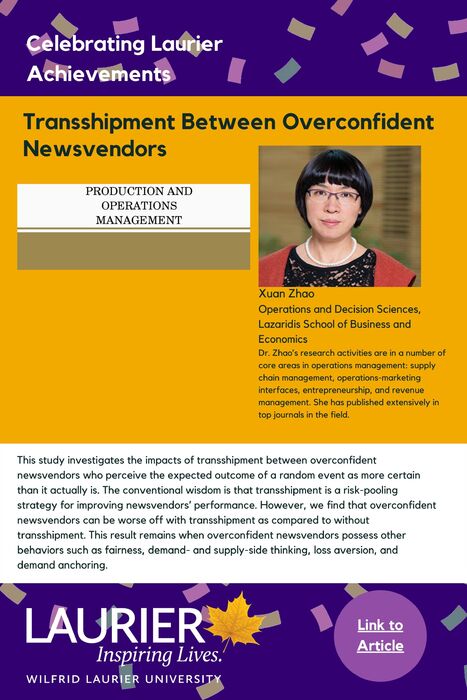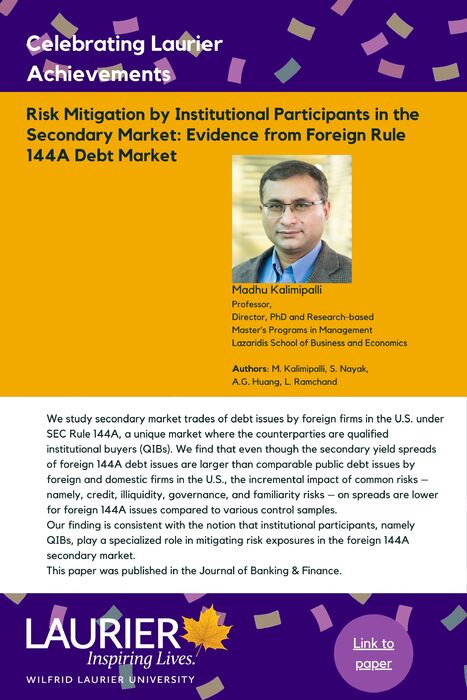-
 Let That Sh*t Go: Find Peace & Happiness in the Everyday
Let That Sh*t Go: Find Peace & Happiness in the Everyday It’s no wonder you can’t calm down: your to-do list is as long as your arm, your bank balance keeps dropping, you feel guilty for not calling your parents more often and there always seems to be a big deadline to meet at work. You need a serious breather—but you can barely find time to shower, let alone to exercise or meditate. In Let That Sh*t Go, Kate Petriw and Nina Purewal share the wisdom they’ve gained though decades of practising and teaching others to find peace of mind no matter how busy they are.
-
 Bank of Canada-Laurier Conference on the Structure of Financial Markets
Bank of Canada-Laurier Conference on the Structure of Financial Markets A series of academic research projects relating to the structure and efficiency of financial markets were presented and discussed. PhD students presented their research via a poster session.
-
Intermediate Accounting
-
 Transshipment Between Overconfident Newsvendors
Transshipment Between Overconfident Newsvendors This study investigates the impacts of transshipment between overconfident newsvendors who perceive the expected outcome of a random event as more certain than it actually is. The conventional wisdom is that transshipment is a risk-pooling strategy for improving newsvendors’ performance. However, we find that overconfident newsvendors can be worse off with transshipment as compared to without transshipment. This result remains when overconfident newsvendors possess other behaviors such as fairness, demand- and supply-side thinking, loss aversion, and demand anchoring.
-
 Risk Mitigation by Institutional Participants in the Secondary Market: Evidence from Foreign Rule 144A Debt Market
Risk Mitigation by Institutional Participants in the Secondary Market: Evidence from Foreign Rule 144A Debt Market We study secondary market trades of debt issues by foreign firms in the U.S. under SEC Rule 144A, a unique market where the counterparties are qualified institutional buyers (QIBs). We find that even though the secondary yield spreads of foreign 144A debt issues are larger than comparable public debt issues by foreign and domestic firms in the U.S., the incremental impact of common risks – namely, credit, illiquidity, governance, and familiarity risks – on spreads are lower for foreign 144A issues compared to various control samples.
Our finding is consistent with the notion that institutional participants, namely QIBs, play a specialized role in mitigating risk exposures in the foreign 144A secondary market.
 Let That Sh*t Go: Find Peace & Happiness in the Everyday It’s no wonder you can’t calm down: your to-do list is as long as your arm, your bank balance keeps dropping, you feel guilty for not calling your parents more often and there always seems to be a big deadline to meet at work. You need a serious breather—but you can barely find time to shower, let alone to exercise or meditate. In Let That Sh*t Go, Kate Petriw and Nina Purewal share the wisdom they’ve gained though decades of practising and teaching others to find peace of mind no matter how busy they are.
Let That Sh*t Go: Find Peace & Happiness in the Everyday It’s no wonder you can’t calm down: your to-do list is as long as your arm, your bank balance keeps dropping, you feel guilty for not calling your parents more often and there always seems to be a big deadline to meet at work. You need a serious breather—but you can barely find time to shower, let alone to exercise or meditate. In Let That Sh*t Go, Kate Petriw and Nina Purewal share the wisdom they’ve gained though decades of practising and teaching others to find peace of mind no matter how busy they are. Bank of Canada-Laurier Conference on the Structure of Financial Markets A series of academic research projects relating to the structure and efficiency of financial markets were presented and discussed. PhD students presented their research via a poster session.
Bank of Canada-Laurier Conference on the Structure of Financial Markets A series of academic research projects relating to the structure and efficiency of financial markets were presented and discussed. PhD students presented their research via a poster session. Transshipment Between Overconfident Newsvendors This study investigates the impacts of transshipment between overconfident newsvendors who perceive the expected outcome of a random event as more certain than it actually is. The conventional wisdom is that transshipment is a risk-pooling strategy for improving newsvendors’ performance. However, we find that overconfident newsvendors can be worse off with transshipment as compared to without transshipment. This result remains when overconfident newsvendors possess other behaviors such as fairness, demand- and supply-side thinking, loss aversion, and demand anchoring.
Transshipment Between Overconfident Newsvendors This study investigates the impacts of transshipment between overconfident newsvendors who perceive the expected outcome of a random event as more certain than it actually is. The conventional wisdom is that transshipment is a risk-pooling strategy for improving newsvendors’ performance. However, we find that overconfident newsvendors can be worse off with transshipment as compared to without transshipment. This result remains when overconfident newsvendors possess other behaviors such as fairness, demand- and supply-side thinking, loss aversion, and demand anchoring. Risk Mitigation by Institutional Participants in the Secondary Market: Evidence from Foreign Rule 144A Debt Market We study secondary market trades of debt issues by foreign firms in the U.S. under SEC Rule 144A, a unique market where the counterparties are qualified institutional buyers (QIBs). We find that even though the secondary yield spreads of foreign 144A debt issues are larger than comparable public debt issues by foreign and domestic firms in the U.S., the incremental impact of common risks – namely, credit, illiquidity, governance, and familiarity risks – on spreads are lower for foreign 144A issues compared to various control samples. Our finding is consistent with the notion that institutional participants, namely QIBs, play a specialized role in mitigating risk exposures in the foreign 144A secondary market.
Risk Mitigation by Institutional Participants in the Secondary Market: Evidence from Foreign Rule 144A Debt Market We study secondary market trades of debt issues by foreign firms in the U.S. under SEC Rule 144A, a unique market where the counterparties are qualified institutional buyers (QIBs). We find that even though the secondary yield spreads of foreign 144A debt issues are larger than comparable public debt issues by foreign and domestic firms in the U.S., the incremental impact of common risks – namely, credit, illiquidity, governance, and familiarity risks – on spreads are lower for foreign 144A issues compared to various control samples. Our finding is consistent with the notion that institutional participants, namely QIBs, play a specialized role in mitigating risk exposures in the foreign 144A secondary market.